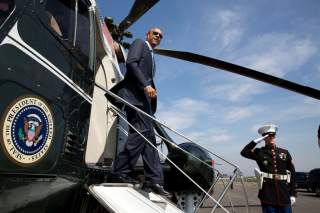Cuba: Obama's Next Foreign-Policy Disaster
"The administration’s foreign policies have dramatically destabilized the Middle East. Now Obama is bringing those failed policies to this Hemisphere."
President Obama has, in fact, demonstrated little regard for the Cuban or the Iranian people. His first big foreign-policy decision, one that presaged his conduct in office for the following five years, was his steadfast refusal to give any comfort, moral or otherwise, to Iranian demonstrators who flooded the streets of Tehran in 2009 demanding democracy. It isn’t hard to divine the reasons for his allergy to intervention: again, he sees “dark chapters in our history” that embarrass him.
In the case of Iran, Mr. Obama is the first U.S. president to implicate the United States in the 1953 overthrow of Mohammad Mossadegh, the elected prime minister of Iran, which occurred because of fears of growing Soviet influence. At his Cairo speech in June, 2009, Mr. Obama said, “For many years, Iran has defined itself in part by its opposition to my country, and there is in fact a tumultuous history between us. In the middle of the Cold War, the United States played a role in the overthrow of a democratically elected Iranian government.”
In the case of Cuba, President Obama and his team have again turned their backs on Cuba’s dissidents. These brave individuals, who routinely face government mobs that come to their homes to insult and aggress them and their families, have said that Obama has “betrayed” them and Cuba by going over their heads and establishing relations with Raul Castro.
Breaking with long-standing U.S. policy on Cuba, President Obama said in Panama City on Saturday that “[w]e are not in the business of regime change,” which is clearly his sentiment on Iran as well. He should be reminded, however, that in both countries, he is following the lamentable approach of another liberal predecessor, Franklin Delano Roosevelt, who said of the Nicaraguan dictator Anastasio Somoza, “[He] may be a son of a bitch, but he’s our son of a bitch,” with nefarious consequences.
#3: “And what’s encouraging is, is that the overwhelming majority of Cubans are interested in ending . . . the last vestige of the Cold War—and moving forward.”
The first part of this sentence has more to do with the component of his speech we have just reviewed: Mr. Obama clearly confuses a ruthless government with the people they actually oppress. He may also be referring to a poll released last week by the Miami-based Bendixen and Associates, which purported to show that an overwhelming majority of people on the island supported his rapprochement with Cuba. Media coverage of this poll has largely omitted two key points: one, there are no free opinions polls in Cuba, where people fear giving their opinion on anything that differs from the official government line; two, Bendixen is closely tied to the administration—it was Obama’s official pollster in the 2012 campaign.
The interesting part, however, is the second part of the sentence: “ending the last vestige of the Cold War—and moving forward.” There are two things to be said about this. The suffering of Cubans is not some historical event that ended with the collapse of the Berlin Wall in 1989 or the disappearance of the Soviet Union in 1991. Cubans are repressed by their own government today. If Mr. Obama wants to be convinced of this, he need only search “Cuba” and “Ladies in White” in YouTube to see how this dignified dissident group of middle-aged women are harassed, beaten and incarcerated in Cuba on a regular basis. Or better yet, he could have taken a stroll outside his hotel in Panama City to see first hand how those associated with Cuba’s government behave, even when they are overseas.
Worse is his morally neutral treatment of the “Cold War,” a sentiment he repeated in his closing news conference in Panama City. There he said, “Sometimes those controversies date back to before I was born. We’re caught in a time warp, going back to the 1950s and gunboat diplomacy, and ‘Yanquis’ and the Cold War, and this and that and the other.”
Mr. Obama is awfully selective about which historical events matter and which do not.
America’s “dark chapters” in Latin America and the overthrowing of Mossadegh do, and they have consequence today. The “Cold War” apparently does not. For the record, the period he refers to was in effect a battle between democracy and totalitarianism, capitalism and communism—or good and evil, if you want to get right down to it. The country he leads won that struggle, after much sacrifice in blood and treasure—a signal achievement for humankind.
President Obama is clearly conflicted by the history of his own country, misreads the balance of power in dictatorships and the historical record of engaging despots who have an existential stake in continuing to be despots. This does not bode well for his “engagement” of regimes that, for decades, previous American presidents have considered beyond the pale of civilized behavior.
Mike Gonzalez is a Senior Fellow in The Heritage Foundation’s Davis Institute for National Security and Foreign Policy and the author of “A Race for the Future: How Conservatives Can Break the Liberal Monopoly on Hispanic Americans.”
Image: Flickr/U.S. gov

